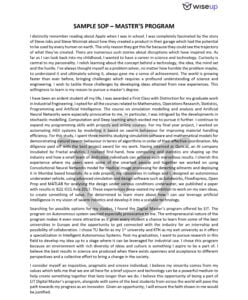Hey there! As a study abroad aspirant, you would be aware of the two documents – Statement Of Purpose (SOP) and Personal Statement, which universities ask you to submit. To understand the differences between them and also learn to craft your own Personal Statement check out our previous blog in the study abroad series – How To Write A Personal Statement? In this blog, you shall learn how to write an SOP to make your application stand out!
What is a Statement Of Purpose (SOP)?
The statement of purpose as the name suggests “states the purpose” of your enrolling for admission in that specific course and that specific university.
Your goal is to convince the faculty and admissions committee that your academic background, experience, and achievements make you a compelling candidate for graduate education.
Typically, most Statements of Purpose (SOPs) have a word limit of 1000 words.
There are totally six sections in an SOP:
- Hook – The motivation to pursue that program.
- Academic Background
- Internship/Research/Work Experiences
- Career Goals – short and long term
- Reason to join – the university and course
- Closing Paragraph
1. Hook – the most important part of an SOP!
The hook is used to captivate the admission committee’s attention and spark their interest in your narrative. Use this section to convey your enthusiasm and motivation for pursuing higher education in a specific field.
Rather than relying on overused methods, such as beginning with a quote from a renowned figure or recounting a childhood tale, aim to think creatively and present a compelling story that showcases your passion for the field.
To know more about how to write the hook portion of an SOP with examples, check out the video below:
2. Academic Background
When discussing your academic experiences, emphasize the subjects studied and their contribution to your field knowledge.
Include any lab work, hackathons, or competitions participated in, showcasing to the admissions committee your solid academic foundation and readiness for the program.
3. Work experiences
Next, you should discuss your work experiences, which may include research experience, internships, or full-time employment.
It is generally advisable to arrange these experiences in chronological order to present a clear, coherent flow of information.
When discussing your work experiences, be sure to describe your roles and responsibilities, the projects you worked on, and the skills you applied.
Instead of simply listing your achievements, try to share some of the challenges you faced, how you overcame them, and what you learnt from the process. By doing so, you can demonstrate to the admissions committee that you can handle similar challenges during the program, should they arise.
4. Career goals
Once you have shared all your experiences, then you should talk about your career goals. After pursuing the program, what do you want to do in life?
What are your short-term career goals, which means what do you want to do in the next 2-3 years, and what are your long-term career goals, that is what do you want to do in the next 5-10 years?
This gives clarity to the admissions committee that you’re not doing this degree out of a whim, but you know how you are going to put this degree into use.
5. Why do you want to join that university?
This step is essential as it involves explaining your reasons for choosing this university and program.
To craft a strong application, thoroughly research the university, identify interesting courses, and note the professors you aim to collaborate with.
Also, consider joining extracurricular activities or societies aligned with your interests. Demonstrating genuine interest through detailed research will enhance your acceptance prospects.
6. Closing
Summarise your suitability for the program and your deservingness of admission.
Highlight what you will gain from the university and how you intend to contribute to the program.
Conclude by expressing your enthusiasm for joining the university and achieving your goals.
To learn more about writing the perfect SOP to get admits from your dream universities, check out the video below
Most Important Step – Get your SOP Reviewed!
Once you have written your SOPs, it is always better to get them reviewed by 3-4 people.
If you would like to get it reviewed directly from us, then do register for our SOP Review Program. Our founder Neha Agrawal has reviewed over 500 SOPs and LORs until now. Check out the video below where she shares her experience about this.
Bonus! Here is a sample SOP for you!

If you wish to learn in more detail how to write a personal statement, SOPs, and LORs, and receive tons of sample essays from top universities, then you can join our study abroad course. Write your Way to Study Abroad.
We are happy to help with any questions or advice you need in this area. Comment below and we will get back to you at the eariest!





4 Responses
Yes it’s very informative
We are glad you found the information on our blog to be useful!
Thanks for sharing. I read many of your blog posts, cool, your blog is very good.
Thanks!! Glad you liked it 🙂